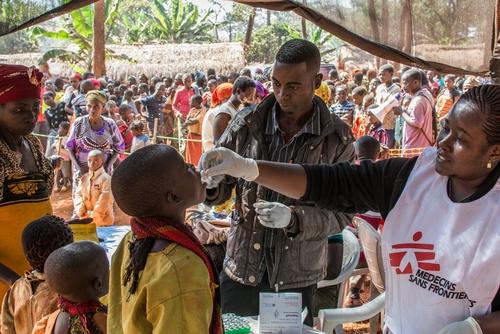Some 115,000 Burundian and Congolese refugees living in Tanzania will be vaccinated against cholera in a mass campaign carried out by Médecins Sans Frontières (MSF) this month. A cholera outbreak was declared in mid-May when thousands of Burundian refugees fleeing political unrest streamed into the camp, almost doubling its size. According to official figures, 3,086 cases and 34 deaths have been reported in Tanzania to date.
The vaccination campaign, which started in the Nyarugusu refugee camp on Saturday 20 June, will continue this week. So far, 55,000 people have received the oral cholera vaccine. In coordination with the Tanzanian Ministry of Health, UNHCR and the World Health Organization, MSF is providing the vaccine to everyone in the camp aged one year and above.
Not enough water
Following the mass influx of Burundian refugees in May, water services in the camp have been stretched. While the situation differs in various sites throughout the camp, refugees only have access to an average of 11 litres of water per person per day, well below emergency standards.
“The situation in the Nyarugusu camp remains extremely precarious,” says Rachel Marsden, Emergency Coordinator for MSF in Tanzania. “Although the number of cholera cases is low at the moment, another influx of people from Burundi could put further strain on existing services, and the risk of another outbreak remains high.”
The oral cholera vaccine: an effective method of cholera prevention
MSF first piloted the use of the oral cholera vaccine as an outbreak control strategy during a cholera epidemic in Guinea in 2012. A study published last year in The New England Journal of Medicine looked at the effectiveness of the vaccine during this outbreak and showed that 86 percent of those vaccinated were protected against cholera.
“While the success of this vaccine is clear, it is part of a holistic response and does not exclude the urgent need to improve water and sanitation conditions in Nyarugusu camp,” continues Marsden. “To reduce the risk of further outbreaks, the provision of safe water as well as health education on the importance of good hygiene practices must also remain a priority.”
Twenty teams each consisting of ten people will carry out the vaccination campaign, and a second round will be carried out in two weeks. The teams will also conduct a nutrition screening to understand the nutritional status of the vulnerable under-five population in the camp.
Inside the camp, MSF has constructed a fully functioning 50 bed cholera treatment centre, with the possibility to expand to 150 beds if needed. Teams are also undertaking outreach activities. In the nearby district of Kigoma, MSF also has a site prepared for another cholera treatment centre and medical and logistical stock is in place should it be required. In Kagunga, a refugee transit site four hours by boat from Kigoma, MSF has set up a 25-bed cholera treatment centre as part of its emergency preparedness plan.



